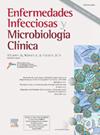A simplified extraction method reduces the processing time for proteomic identification of nontuberculous mycobacteria
IF 2.5
4区 医学
Q3 INFECTIOUS DISEASES
Enfermedades infecciosas y microbiologia clinica
Pub Date : 2025-08-01
DOI:10.1016/j.eimc.2025.03.001
引用次数: 0
Abstract
Introduction
The identification of nontuberculous mycobacteria (NTM) by proteomic procedures has improved in the last few years. Strains from different geographical locations differ in their proteomic patterns, limiting the applicability of general databases for accurate identifications.
Methods
We have optimized an alternative extraction protocol to Myco-Ex, and MBT, the protocols recommended by Bruker Daltonics, the manufacturer of MALDI Biotyper, a Matrix-Assisted Laser Desorption/Ionization Time-of-Flight Mass Spectrometry (MALDI-TOF MS) system. 120 clinical isolates, one environmental strain (Mycobacterium canariasense) and 7 quality controls were tested from the Spanish Society of Clinical Microbiology and Infectious Diseases (SEIMC). All strains were also sent to the Laboratory of Mycobacteria belonging to the National Spanish Reference Center (Instituto de Salud Carlos III), that uses several molecular methods for mycobacterial identification. The proteomic extraction method includes a single extraction/inactivation formic acid step. 30 NTM strains were analyzed to certify the biosafety of the procedure, testing their viability after this procedure.
Results
The score ranges of the isolates were 1.61–2.16 (mean 1, 84) for the 88 isolates of the slow growing mycobacteria group (SGM) and 1.66–2.33 (mean 2.06) for the 40 isolates of the rapid growing mycobacteria group (RGM). Isolates exposed to formic acid were incubated for 8 weeks and growth was observed in neither the clinical isolates nor the controls.
Conclusions
We have developed a simpler and faster procedure for the proteomic identification of nontuberculous mycobacteria (MALDI-TOF) retaining significant scores without compromising biosafety.
简化的提取方法减少了非结核分枝杆菌蛋白质组学鉴定的处理时间
近年来,蛋白质组学方法对非结核分枝杆菌(NTM)的鉴定有了很大的进步。来自不同地理位置的菌株在蛋白质组学模式上存在差异,这限制了通用数据库对准确鉴定的适用性。方法采用基质辅助激光解吸/电离飞行时间质谱(MALDI- tof MS)系统的制造商Bruker Daltonics推荐的提取方案,对Myco-Ex和MBT进行了优化。对来自西班牙临床微生物学与传染病学会(SEIMC)的120株临床分离株、1株环境菌株(加那利亚分枝杆菌)和7株质量控制株进行了检测。所有菌株也被送到西班牙国家参考中心(Salud Carlos III研究所)的分枝杆菌实验室,该实验室使用几种分子方法进行分枝杆菌鉴定。蛋白质组提取方法包括单个提取/失活甲酸步骤。对30株NTM菌株进行分析,以证明该程序的生物安全性,并在此程序后检测其活力。结果88株慢生长分枝杆菌组(SGM)和40株快速生长分枝杆菌组(RGM)的分值分别为1.61 ~ 2.16(平均1.84)和1.66 ~ 2.33(平均2.06)。暴露于甲酸的分离株孵育8周,临床分离株和对照组均未观察到生长。结论:我们开发了一种更简单、更快速的非结核分枝杆菌(MALDI-TOF)蛋白质组学鉴定方法,在不影响生物安全性的情况下保持了显著的分数。
本文章由计算机程序翻译,如有差异,请以英文原文为准。
求助全文
约1分钟内获得全文
求助全文
来源期刊
CiteScore
2.10
自引率
8.00%
发文量
194
审稿时长
29 days
期刊介绍:
Hoy está universalmente reconocida la renovada y creciente importancia de la patología infecciosa: aparición de nuevos agentes patógenos, de cepas resistentes, de procesos con expresión clínica hasta ahora desconocida, de cuadros de una gran complejidad. Paralelamente, la Microbiología y la Infectología Clínicas han experimentado un gran desarrollo como respuesta al reto planteado por la actual patología infecciosa. Enfermedades Infecciosas y Microbiología Clínica es la Publicación Oficial de la Sociedad Española SEIMC. Cumple con la garantía científica de esta Sociedad, la doble función de difundir trabajos de investigación, tanto clínicos como microbiológicos, referidos a la patología infecciosa, y contribuye a la formación continuada de los interesados en aquella patología mediante artículos orientados a ese fin y elaborados por autores de la mayor calificación invitados por la revista.

 求助内容:
求助内容: 应助结果提醒方式:
应助结果提醒方式:


